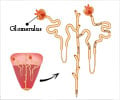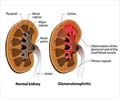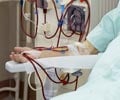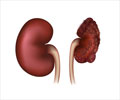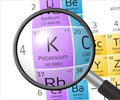Q: Which doctor should I consult for chronic renal failure?
A: A Nephrologist or a Physician with interest in kidney diseases. Nephrologist is a physician, whereas if surgery is necessary a surgeon performs it and this usually is a urologist.
Q: Can I catch kidney disease from someone who has it?
A: No. Kidney disease is not contagious. You cannot catch it from someone. Most kidney disease is caused by diabetes, high blood pressure and conditions that can run in families. If you are a family member of someone who has diabetes, high blood pressure, or kidney disease, it is a good idea to ask your doctor to check your blood pressure and kidney function at your checkup.
Q: What are kidney stones?
A: A kidney stone occurs when substances in the urine form crystals. Kidney stones can be large or small. Large ones can damage the kidneys; small ones may be able to pass in the urine. Since crystals have sharp edges, passing even small stones can be very painful. Treatment depends on what the stones are made of.
Q: What is PTH?
A: Parathyroid hormone (PTH) is produced by several small, bean-like parathyroid glands in your neck. Its "job" is to tell your bones to release calcium into your bloodstream. Too much PTH can become a problem in people with kidney disease.
Healthy kidneys convert a hormone called calcitriol to its active form of vitamin D. Calcitriol lets your body absorb calcium from food you eat. When your kidneys are not working well, they start to make less calcitriol - so even if you eat calcium, your body can't absorb it. PTH kicks in to make sure you always have enough calcium in your blood. Over time, this can weaken your bones.
A blood test can show if your PTH levels are above normal. If they are, your doctor may prescribe a form of active vitamin D.
Q: I have a family member with polycystic kidney disease (PKD). Should I be tested?
A: Since 60-70% of people with PKD have a family member with PKD, asking your doctor about being tested seems like a good idea. The first test used for PKD is an ultrasound to look at the kidneys and see if there are cysts. No contrast dye is needed, so this is a non-invasive test. Depending on tour age and cysts that are found, a diagnosis can be made.
This is more important if you are considering donating a kidney to someone who is related to you.
Q: If I have signs of kidney disease, what should I do?
A: After you have basic screening tests done, if you have signs of kidney disease, you should ask for a referral to a nephrologist, a specialist in treating kidney disease. A nephrologist will perform an evaluation then suggest medications or lifestyle changes to help slow the progression of kidney disease.
Q: I just found out I have kidney failure. Does this mean I am going to die?
A: No. Dialysis or a kidney transplant can keep you alive when your kidneys fail. The more you learn and take part in your treatment, the better you can feel. Some people live for decades with kidney failure and there are others who are on dialysis for many years and continue to work and have a relatively normal lifestyle, however most studies show that the quality of life after a kidney transplant is better than being on life time dialysis.
Q: When should I be referred to a nephrologist?
A: You should be under the care of a nephrologist if your creatinine clearance, a measure of your kidney function, is 30 mL/min or lower. This translates to stage 4 chronic kidney disease (CKD).
When you first find out you have CKD (even if it is stage 2 or 3), seeing a nephrologist at least once can help you develop a plan of care. A nephrologist can help you and your primary care doctor to:
- Slow the rate of decline of your kidney function
- Decide if a kidney biopsy might be useful
- Diagnose the type of kidney disease and whether it might be reversible with treatment
- Manage complications of kidney disease, such as anemia, high blood pressure, metabolic acidosis, and changes in mineral balance
Q: Are there any drugs or diet that can help me if I have chronic in Kidney disease?
A: Ongoing research continues on dietary changes and drugs that may help slow the progression of CKD. Examples include:
- Fish oil for IGA nephropathy
- Pirfenidone (an anti-fibrotic drug) in the treatment of focal segmental glomerulosclerosis (FSGS)
- Dietary intake of antioxidant or anti-inflammatory vitamins and foods
Q: What kind of Lifestyle changes are recommended if I have Kidney disease?
A: Lifestyle changes such as losing weight, exercising, meditating, eating less salt and drinking less alcohol can help lower your blood pressure.
Q: am diabetic and have early kidney disease. What should I do?
A: If you have diabetes, strict controls of your blood glucose levels can help slow the progression of kidney disease.
Keep your hemoglobin A1c, which measures blood glucose control over the last three months, to less than 6.5%. To reach this level of strict glycemic control, you will need to monitor your blood glucose closely to avoid hypoglycemia. You may need to use frequent insulin injections or an insulin pump. Talk to your doctor about your diabetes treatment options.
Q: What should be my blood pressure if I have kidney disease?
A: Study after study has confirmed that good blood pressure control can help slow the rate of CKD. This is especially true in people who have diabetes and protein in the urine (proteinuria). Keeping blood pressure under control also helps prevent heart disease and stroke. According to National Kidney Foundation (NKF) guidelines, you should strive to keep your blood pressure at or below 130/80 if you have CKD. If you have diabetes and/or proteinuria too, their current suggested target blood pressure is even lower at 125 / 75. For most people with CKD, blood pressure drugs are also needed. The first blood pressure drug is likely to be an "angiotensin converting enzyme inhibitor" (ACE inhibitor) or an "angiotensin receptor blocker" (ARB), because these drugs have been proven to slow the rate of some types of kidney disease. Other types of blood pressure drugs such as a diuretic (water pill) or a calcium-channel blocker may be added, as needed. Ask your doctor what you can do to keep your blood pressure at a healthy level.
Q: When should I start the process to get a kidney transplant?
A: If your kidneys are failing, a kidney transplant may be a treatment option for you. The balance of risks and benefits varies, though, depending on your age and other health problems. If you want a kidney transplant, you must contact a transplant center and ask for a transplant evaluation. It is not automatic. Only a transplant team can tell you whether you are definitely eligible (or not eligible) for a transplant.
You can contact one or more transplant centers and start to evaluate;when it seems likely that you will need dialysis within two to three years. Most kidney transplants are successful- more than 90% of transplants are still working one year later. Recent studies have found that the odds of good results are somewhat better with a "preemptive" transplant, done before dialysis is needed. Preemptive transplant requires a willing living kidney donor-probably a relative, spouse or friend.
Q: If I get a rejection after transplant, can it be treated or will I lose my transplanted kidney?
A: If you have acute or chronic transplant rejection, your doctor may change your medication, or even hospitalize you. For example, if your cyclosporine dose is harming your transplanted kidney, your doctor might lower your dosage and change your other medications. All medication changes must be made by your transplant team.
It is seldom that you will lose your transplant graft and most are treatable provided the right action is taken at the right time. Hence you must follow the advice of your doctors carefully.


